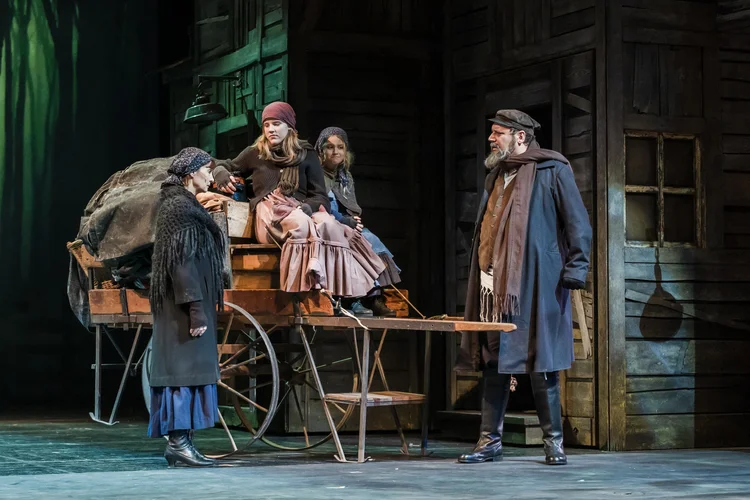The musical "Anatevka" is based on the stories "Tevje, the Milkman" by Scholem Alejchem. Changing times in the early 19th century force many changes on Tevje and his wife Golde: The daughters take different paths than those intended for young women in the Eastern Jewish shtetl.
Scholem Alejchem's "Tevye der milkhiger" ("Tevye the Milkman") is the story of Tevye, constantly tempted by and doubting God, who nevertheless does not lose his faith. Although the stories of Tevje's daughters are the most interesting, Tevje remains the protagonist. The antagonist, so to speak, is the changing times. Tevje's reactions are forced upon him by his daughters and illustrate his conflict with modernity. Zeitel, Hodel and Chava place their personal desires above those of their parents and society: the commandments of God and his Torah do not mean that much to them. Unlike their father and his generation, they do not look upon the non-Jewish world with fear, but find it attractive and irresistible.
Scholem Alejchem wrote "Tevye" over a period of 21 years, between 1895 and 1916, and precedes each episode with a date. Historical events, such as the Russian Revolution of 1905 and the unhappy period that followed, the Constitution, the Russo-Japanese War, pogroms all resonate in the text. The attention given to dates and historical events is significant because Sholem Alejchem juxtaposes faith and modernity in "Tevye". Although the loose, episodic structure of the work suggests that Sholem Alejchem had no overarching plan when he began writing the "Tevye" stories, a structure does emerge towards the end. The focus moves from the personal to the familial and then to the national.

One gets the impression that if Tevje had been born a generation later, he would have been drawn to the worldly like his daughters. Faith and scepticism constantly compete within him. Like Job, Tevje calls on God in pain while at the same time blessing him. Like Job, he questions, criticises and challenges God, hoping for an answer and a key to his mysteries, and like Job, he never receives that answer. Yet he is a believer. He seasons his appeals to God with humour and irony and a sense of the absurd - unlike Job. Although Tevje and his personal difficulties are always at the centre, it is his daughters and not he who are the actors in the stories. Tevye reacts to what they do, he does not determine it. When you compare the daughters' lives with their mother's, you immediately see the amazing changes in the women's situation and attitudes towards them that took place in only a very short time.
What do you mean they got engaged in secret?
Tevje
The story of Zeitel, the eldest daughter, who refuses to marry the rich butcher Lazar Wolf and insists on marrying her childhood sweetheart, the poor tailor Mottel Kamzoil, is appropriately called "Hayntike Kinder". These children of today see love as the decisive factor in a marriage. These new priorities, that is, that one's will is the greatest necessity in one's choice, signify the break-up of traditional society. Even the older generation is beginning to follow these new trends. Lazar Wolf, a man old enough to be Zeitel's father, decides to leave the matchmakers aside and choose his own bride. Despite this decision, his courtship of Zeitel is reminiscent of the worst kind of flesh trade. The comic scene in which Tevye believes Lazar is interested in his cow and not his daughter is not just comic: it is an uncomfortable reminder that women can be talked about in the same language as cattle, and that they can also be bought and sold like cattle. It is no coincidence that the hopeful groom is a butcher by trade.

Although Tevje is secretly relieved when Zeitel refuses to marry Lazar Wolf, his reaction when he learns of the secret engagement shows how uncomfortable he still feels with the new morality: Tevje: "There was only one thing I couldn't understand at all: What do you mean they got secretly engaged? What kind of world has this become? A boy meets a girl and says to her 'let's give each other our word that we will get married' ... are there no rules left in the world?" Tevye's world was not as class-conscious as the world that surrounded him, because in Judaism being attacked was seen as a common fate (after all, the non-Jewish world did not distinguish between poor and rich Jews). Nevertheless, people far down the social spectrum believed they could feel superior to people of even lower status. Mottel the tailor might have earned similarly to Tevye, but his profession made him socially inferior. Golde: "In our family there are teachers, cantors, musicians, gravediggers, ordinary poor people, but not, God forbid, tailors or shoemakers."
Dad, am I worth less than a word?
Zeitel
Zeitel's sister Hodel enters a different world from her sister, who has chosen her own husband. She is completely loyal to the man she loves and endowed with a passion worthy of revolutionary times. These changes seem to have affected Tevye as well. When the matchmaker tells Tevje to take Hodel to a potential husband, the latter replies, "What do you mean, 'take' her. You take a horse to market or a cow to sell !" - says the Tevye, who recently could not distinguish whether the conversation was about his milk cow or his daughter! Nevertheless - when Hodel and Perchik announce their marriage to him, Tevje again finds himself on the paternal offensive. We can assume that, like most Jewish revolutionaries, they would lead secular lives.

The third daughter, Chava, thirsts for the knowledge of the outside world. The name comes from the biblical Eve, who sins by eating from the Tree of Knowledge and is banished from her home, the Garden of Eden. Chava's friendship with Fedya the Gentile significantly begins with them exchanging books. As a result, she too is banished from her homeland to a harsher world. Despite his doubts, Tevye's relationship with God forms the basis for his decision to reject his daughter. He sees it as his duty as a Jew to raise his children to Judaism; as the father of a daughter who has converted to Christianity, he feels he has failed. The Jewish community felt threatened spiritually and physically by the loss of every single Jewish soul, and so the reaction to converts was extreme and unrelenting. By equating spiritual rebellion with physical death, Judaism reacted not with excommunication but with mourning.
Tevye's last words, "Undzer alter got lebt" are at once critical and devoted to God. This is the same God who so tested him as a father and as a Jew. The two are inseparable. The daughters' lives show the difficulties of Jewish survival. By breaking away from parental authority, assimilating, acquiring worldly knowledge and converting, Tevye's daughters embody the Jewish challenges in times of trial and transition.
